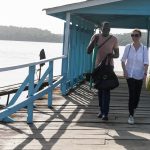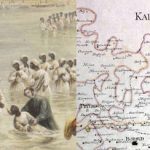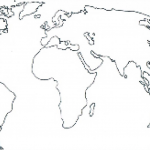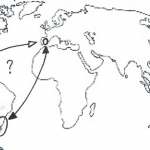
Upriver to Mazaruni Prison (Guyana)
One of the wonderful things about ‘blue skies’ research is the element of surprise that it can throw up. When I began work on ‘The Carceral Archipelago’ project, I had not planned to work on the British Caribbean. I had long been aware of early-modern British and Irish convict flows to islands like Barbados, […]

‘Conceptual Experiments’ in Carcerality and Colonialism
Preamble: In December, the Carceral Archipelago team – including Clare Anderson, Kellie Moss, Katie Roscoe, Carrie Crockett, Lorainne Paterson, Anna McKay, and Adam Barker – attended the Carceral Geographies Conference at the University of Birmingham. For those interested in further content from the conference, please see this Storify, and full talks and presentation slides are […]

A Snapshot of Collaborative Work in History
During my PhD study and for the first ten years of my academic career, I researched alone. I went to the archives, I discussed and presented my work to academic audiences, and I published books and academic papers. Though like many others, I felt myself to be engaged in a larger intellectual project (subaltern studies, […]

Thinking About Convict Objects, in French Guiana
In the Musée Départemental Alexandre Franconie in Cayenne there is a room dedicated to the history of the French colonial bagne (prison). Among the displays of artwork copied from the paintings of the well-known convict artist Francis Lagrange are a handful of objects made by convict craftsmen. One is by Lagrange himself, a small and […]

The Carceral Archipelago Conference, Leicester 13-16 September 2015
The Carceral Archipelago conference, held in Leicester from 13 to 16 September 2015, felt just like reading over thirty outstanding monographs in two-and-a-half days, getting to know their authors personally, and having the chance to reflect collectively about their mutual entanglements. It was an intense marathon through the burgeoning field of the global history of […]

Where Empires Meet
In a previous blog, I wrote on the theme of the politics of comparison, of the connected history of circulation and mobility that underpins the CArchipelago project team’s approach to the historiography, theory and archive of penal colonies. Research associate Christian De Vito has since expanded the discussion, discussing the basis of various approaches […]
Admin, Conference, and Website, Oh My!
In the year since I joined The Carceral Archipelago, it has been a pleasure to support the novel and extensive research being conducted by the project’s members. Our team is conducting research on and about five continents over as many centuries and making exciting connections and discoveries in archives, at heritage sites, and in fruitful […]

Comparisons and Connections (part 2)
In her last blog (https://staffblogs.le.ac.uk/carchipelago/2015/02/05/the-politics-of-comparison-writing-a-global-history-of-punishment/), Clare Anderson points to the challenges the Carceral Archipelago Project faces in writing the history of punishment as global history. Indeed, addressing the singularity of each site and connection of convict transportation and proposing broader interpretations is a complex task, which requires a high degree of self-reflexivity regarding our methodological […]

Comparisons and Connections (part 1)
In her last blog (https://staffblogs.le.ac.uk/carchipelago/2015/02/05/the-politics-of-comparison-writing-a-global-history-of-punishment/), Clare Anderson points to the challenges the Carceral Archipelago Project faces in writing the history of punishment as global history. Indeed, addressing the singularity of each site and connection of convict transportation and proposing broader interpretations is a complex task, which requires a high degree of self-reflexivity regarding our methodological […]

Recent Comments